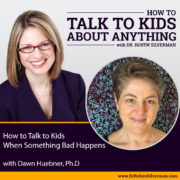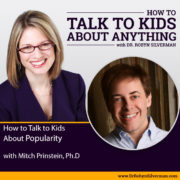How to Talk to Kids When Something Bad Happens in the World with Dawn Huebner, PhD
Special guest: Dawn Heubner, Ph.D
We all want our children to feel safe, secure and engaged in their lives. But when big, bad things happen in the world- from mass shootings to natural disasters to other tragedies detailed on the news and filtered through the adults at the restaurant, the neighbors on the street, the kids on the bus and friends at school- the world can feel a little less safe and secure for many of our children. How can we reserve our kids feelings of optimism, safety, security, strength and that inexplicable feeling that comes with a carefree childhood when scary things happen across the world, across the state or across the street? For this important topic, we turn a second time to past podcast guest, Dr. Dawn Huebner who you’ll remember from our discussion about worry and anxiety and how to help our kids when they worry too much—a great and helpful podcast episode that I urge you to listen to after this one.
Dr. Dawn Huebner is a Clinical Psychologist and Parent Coach specializing in the treatment of anxiety. She is the author of 9 books for children including the perennial best seller, What to Do When You Worry Too Much, and more recent, Outsmarting Worry. Dr. Huebner’s newest book, coming out THIS WEEK called Something Bad Happened, provides support for children learning about big bad things happening the world. Dr. Huebner has been featured on news and information outlets including the TODAY Show, CNN, Parent’s Magazine and more. She maintains a private practice in Exeter, NH.


